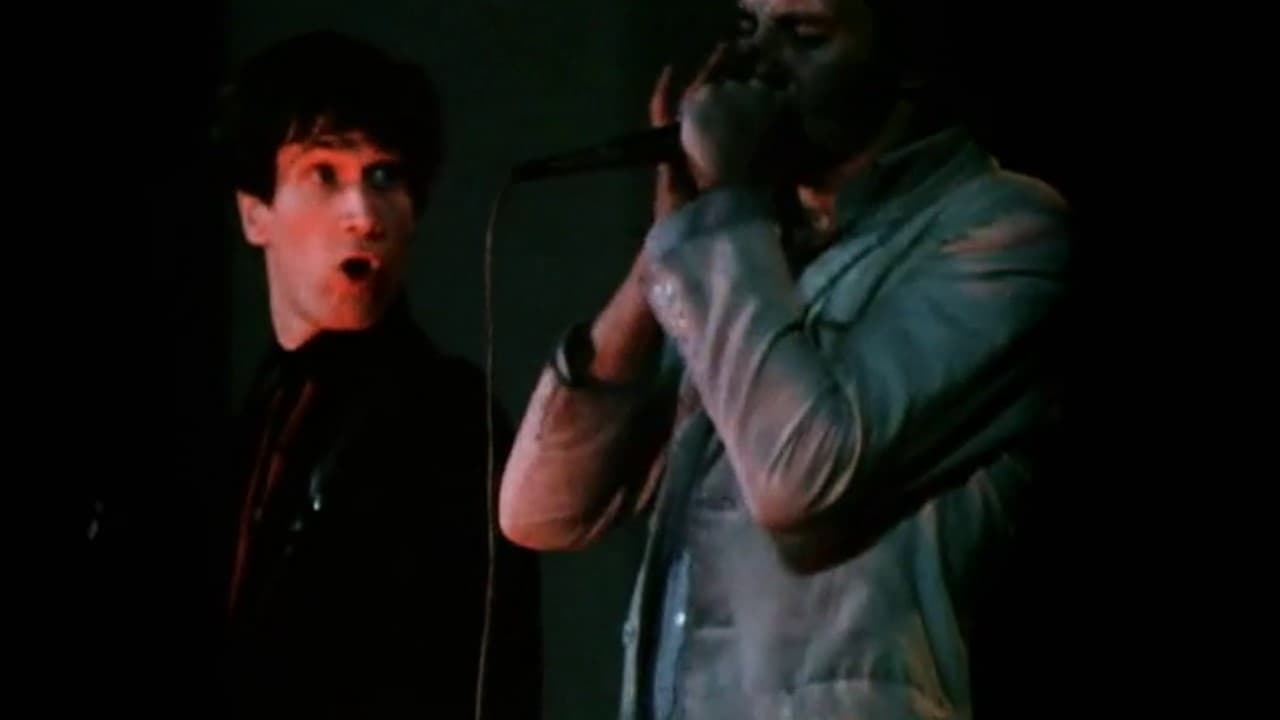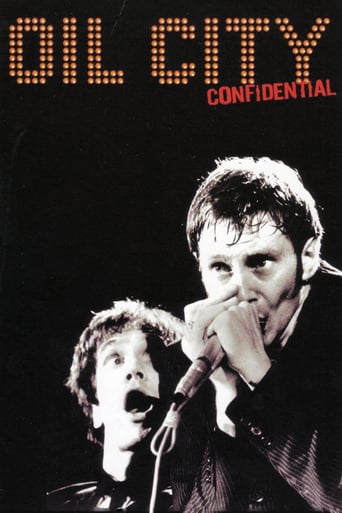SincereFinest
disgusting, overrated, pointless
Kidskycom
It's funny watching the elements come together in this complicated scam. On one hand, the set-up isn't quite as complex as it seems, but there's an easy sense of fun in every exchange.
pointyfilippa
The movie runs out of plot and jokes well before the end of a two-hour running time, long for a light comedy.
Bud Dhuu
What can I say? A real band from the unparalleled reality of the British pub rock scene. Dr Feelgood were raw, biting, cutting and sincere. For me they ended when Wilko left: for others they ended when Lee died. For other others they're still going strong.For me, the heart and soul of the band was always the eccentric, mesmerising guitar maniac, Wilko Johnson: he of the red scratchplated Telecaster and the totally unexpected, post-cancer resurrection. This documentary movie is presented, narrated, almost curated by Wilko himself.If you were there you'll love it to death. If you weren't then you may wish you were. If you don't get it then look up videos and MP3s of Dr Feelgood at their 70s peak.Welcome to rock and roll reality in all its surreal, mundane strangeness. I will never understand how anyone could live without it.
jingster666
I was fortunate to have seen Dr. Feelgood on several occasions in the mid-'70s featuring the original lineup. I was excited when I found out about this documentary and ordered it right away. I was concerned that it might not capture the spontaneous nature and in-your-face, high energy of the band live, nor the uniqueness of its key members, Wilko Johnson and Lee Brilleaux. I needn't have worried because this is without doubt the best possible reading of these lads from Canvey Island. I had always wondered what happened to these Punk precursors and why Wilko Johnson so abruptly left the band at the zenith of their popularity. I had also wondered about the dynamic between Wilko and Lee Brilleaux, the front man and blues harp player. Anyway, these questions and a world of others were answered in watching this remarkable documentary. It is not only the history of this particular blues rock band but also that of a transitional historical moment when rock'n'roll shifted so radically to a harder and more basic paradigm, opening up a world of new musical possibilities for a genre which had become stagnant and boring. Dr. Feelgood were truly avatars helping to save rock'n'roll from a certain death by corporate dictum.
John Downes
I don't listen to a lot of popular music so I was late discovering the Feelgoods... by the time I found out about them their best days were over. This film sets out what I missed.It would have been much easier to have produced a talking heads bio-pic using interviews with the musicians and their connections, but instead Julien Temple gives us a clever narration tracing the history of Canvey Island (with newsreel clips from the devastating flood of 1953), the way the guys met each other and (this is the clever bit) inter-cutting it with entertaining and illustrative clips from black and white gangster films from the golden age of British film-making. I spotted Payroll (1961), The Criminal (1960), Brighton Rock (1947), but I am sure there are others in there too.The main narrative is given by Wilko Johnson, a seminal figure in British music of the 1970s, who tells us about his personal history before and during his time with Dr Feelgood, the band which he joined and helped to make great in the early 1970s. It covers the early success with their first three albums, and relates how personal differences led to him leaving after their fourth album, "Sneaking Suspicion". The surviving members of the original line-up, Wilko Johnson, Big Figure, and Sparko are all featured and it's nice to see that they are all remain great friends.There is archive footage of the band performing as well as interviews with Lee Brilleaux who died of lymphoma at the tragic age of 41.If I make any criticism of this film at all, it is that we are not shown more of Gypie Mayo, who replaced Wilko Johnson as lead guitarist in 1975. He was another top-drawer guitar player whose sound drove the Feelgoods in a slightly different direction, leading to great popular success. But the film is basically Wilko's story, and let's take it as that. Big thumbs up, top stuff.
Spikeopath
Director Julien Temple brings to a conclusion his trilogy of documentaries about three of the United Kingdom's most important 1970s music movers. Preceding this story about seminal pub rockers Dr Feelgood was The Filth and the Fury (2000) (The Sex Pistols) & Joe Strummer: The Future Is Unwritten (2007). Dr Feelgood were one of those bands that had legions of fans yet never hit the big time, they themselves would joke that they were the biggest band on their own island! Thanks to Temple tho, a unique and wonderful British film maker, there is now a chance for music fans with a bent for film and documentaries to find out about this rocking and most influential band that hailed out of Canvey Island in Essex, England, in the early 1970s.The story follows a familiar trail, from early humble roots in their home town when they were children, to their forming of a band and the inevitable implosion as egos take control. But told with actual film footage and reminisced by the surviving members of the band {frontman Lee Brilleaux sadly passed away in 1994}, Temple provides a fascinating insight into how hard working and talented this lot were. There's also so much to learn, even for fans such as me, every section of the film brings more knowledge to the party. Be it with their skiffle and jug band days, or their explosive switch to maximum R&B, there's a story to be told, none of which is twee or slotted in as a time filler. Temple also has an entertaining knack of using clips from old classic movies to help the narrative flow, that in itself provides a spot of fun for the movie fan to see how many they can name (I did rather well even if I don't say so myself!).Lee, Wilko Johnson (what a character and a musician), The Big Figure & Sparko, four guys who formed a band and made waves in the music industry. Not by any trickery or cunningly crafted marketing ploys, but by pure raw energy and a love of their craft. As stated in the film, they were punk before punk, with that it's no surprise to find that The Ramones were often found listening to Feelgood albums on a daily basis. There's a reason the likes of Richard Hell, Joe Strummer and Glen Matlock are interviewed in the piece, it's to show that the Feelgood's are the link that paved the way for the punk explosion. The music genre the band belong to was termed pub rock, which while hardly flattering actually speaks volumes for how confined they were, not by choice or design, but a victim of circumstance and era. They were not on their own, The 101ers, Eddie & The Hot Rods & Nine Below Zero, all great great bands deserving of higher accolades. It's hoped that now, with Temple's gritty Canvey Island Noir, that more people will seek out music from this ballsy bit of 70s Britannia. 9/10

